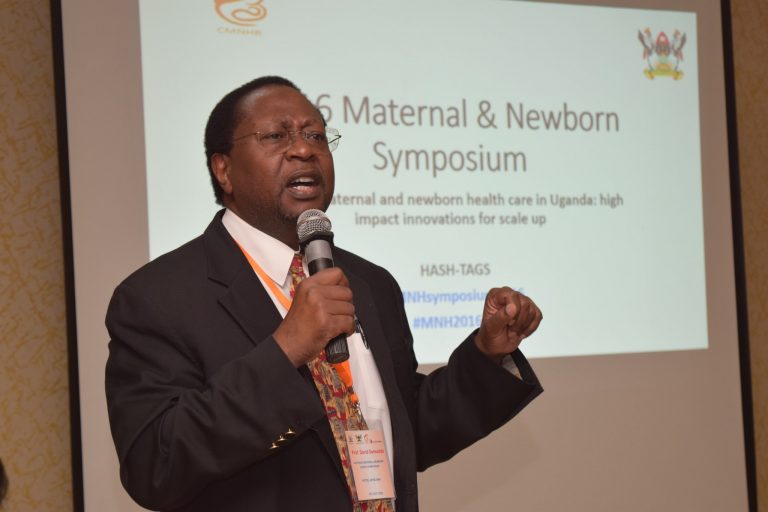This blog comes form a talk by Prof. David Serwadda at the 2nd Uganda Maternal-Newborn Health Symposium held in Kampala on October 19, 2016. The acclaimed professor’s talk was transcribed by Kakaire Ayub Kirunda. The blog is originally published here.
I don’t have slides but I will just talk. And to be honest, it has been a long time since I handled newborn care. But I will share with you some of what I know about HIV. From the slides that Prof Fred Wabwire-Mangen has just shared, the MDG targets that we somewhat performed well relate to HIV. It seems to me that the HIV response has been lucky because of the leadership, the consensus, the ability to have smart targets are easily definable and outcomes that are easily measurable. These targets actually provide advocacy and the ability to mobilise funds to be able to achieve our goals.
When I look at the Millennium Development Goals, we do not have any targets that looked at the newborn. We had targets about under five. As we try to achieve under five and infant mortality, newborn mortality was constant. So there has been a lack of leadership and advocacy, on issues related to newborn.
There are around 85,000 deaths (mothers, newborns and stillbirths) around the time of birth annually in Uganda. Yet those associated HIV are around 42,000. I have also learnt that deaths associated to hepatitis worldwide are far beyond those attributed to HIV. But look at the resources that have been put into HIV. So it is a question of really mobilising and creating the urgency and importance of newborn.
Unfortunately, I don’t think there is going to be any more money in the health sector moving forward than there has been over the last 10 years. So it’s a question of mobilising, creating the urgency and the importance of newborn. We are not going to get more money necessarily focussing on newborn, it is a question of how we are going to package, develop the advocacy, create this as an emergency, human rights issue, to be able to tap into the resources that are already available. Let me tell you, in order to get the money required for HIV, there was a group called ACT UP; they would stand on the tables, bang the tables telling ministers of Health ‘we need money for drugs now.’ It was unbelievable. That is what actually created the money for research and treatment. It is advocacy and the ability to get attention; that’s what we need to get from HIV to the newborn agenda. HIV meetings were not moral talks, it was action now. That is how we got money and HIV on every body’s agenda. The politicians were not very interested in talking about HIV/AIDS issues. So I think the data [MNH] is appalling and that should scandalise anybody. We need to create advocacy around this.
The other thing is that we need to improve the infrastructure including human resource, facilities, in order to care for people. We all know that having mothers deliver in hospitals has been a very stubborn number to move. Yet we know that for most of the causes of newborn mortality, if you are not around a hospital and more so if you have had a premature newborn, the chances of mortality are very high. So having women deliver under skilled care and facilities being in position to deliver quality care is a sensitive issue that needs urgent attention.
Drawing on lessons from PMTCT plus you can start coverage as soon as you find that a pregnant woman is HIV positive and you are only dealing with a denominator of HIV positive. Here we are trying to deal with a denominator of all pregnant women. But all pregnant women are actually moved into testing and counselling. So there should be mechanisms that we can ride on in trying to keep even those who are HIV negative but pregnant into care to be able to maintain and retain them there right up to the end. And I think there is a missed opportunity there to ride on to those services.
To be honest, we can argue that HIV has helped improve health facilities particularly in rural areas. We have been allowed to be able to renovate structures, facilitate maternity centres to be more attractive for women to deliver. So that’s an opportunity we need to use carefully to be able to tweak it a bit to improve neonatal care.
I have a chat with Dr [Glasius] Mukasa [Chairperson of the Newborn Steering Committee] but what we need to do to reduce neonatal mortality is not that complicated. Therefore I think it is possible if there is that coordination, focus, and as I said, advocacy.
Everybody has talked about financing. I am sorry to disappoint you. There is not going to be any more money. I doubt. We may actually need to be innovative with the resources that we have. Even in HIV we have been told that the money coming in starting next year is going to be much less. So I think, maybe you really need to do a good dance around Bill Gates to put some more money under reproductive health, child wellbeing and then channel a little bit of that into neonatal health.
In summary what you need to learn from HIV is advocacy. Make the case that this is not a situation that can be ignored. Embarrass everybody for not doing anything.
Thank you.
*Professor David M. Serwadda, is a Ugandan physician, medical researcher, academic, public health specialist and the immediate former Dean of the Makerere University School of Public Health
